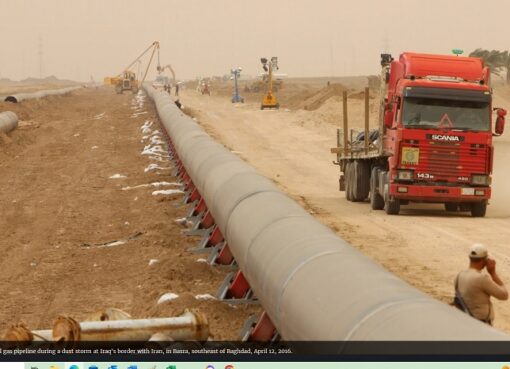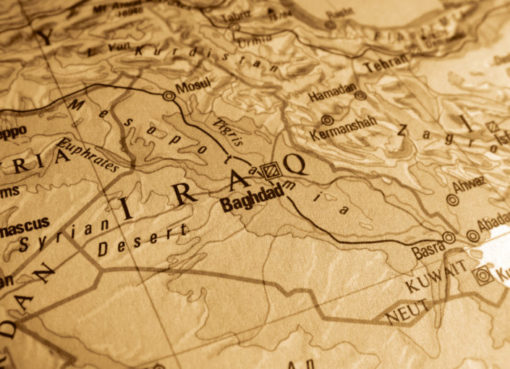The Iraqi government is trying to encourage investment inside the country. However, Iraqi businesspeople are seeking a safe haven – away from violence, heavy taxation and too much red tape – and they are increasingly seeing the eastern European country of Georgia as a good investment.
At a recent meeting of Baghdad’s most successful businessmen, one of them – Madyan al-Kadhimi – revealed that over the past few months, he had started investing in real estate elsewhere – more precisely, al-Kadhimi thought his money was better off in Georgia in eastern Europe.
Too much bureaucracy in Baghdad and the incentives offered by the Georgian government were reasons why he was putting more money into that country, al-Kadhimi said. “There’s a lot of trouble caused because of the ignorance of bodies responsible for investment in this increasingly important sector here,” al-Kadhimi argued. “It’s too confusing and it makes extra work for us.”
“In Georgia you can own land, you get a right of residency and tax incentives – all that has created a great environment for investment there,” says Emad Nathin, another Iraqi business man who’s investing in the former Soviet Union satellite.
Nathim works in the agricultural sector and says over the past few years his business has not been doing well because of, he says, strict rules and too much bureaucracy and because of the decline in any incentives offered to businesses in Iraq. Nathim is so enthusiastic about his new investments he describes Georgia as “the jewel of the Caucasus”.
Since the end of the Soviet Union, the country has become more and more attractive to investors, with low tax rates, a positive climate for investment and few obstructions to starting a business there. Additionally Iraqis can enter Georgia visa free and stay for up to 360 days, after which they may apply for residency.
Previously Iraqi investors were fairly focused on the Gulf Arab countries, if they were going to take their money outside of Iraq. However now more of them are looking positively at countries like Malaysia, Serbia and Bosnia, along with Georgia.
The Iraqis are not the only Middle Eastern country enjoying Georgia either. Iranians are increasingly investing there and between 2005 and 2010, Georgia’s top international investors also came from the United Arab Emirates, alongside the United Kingdom, Turkey, the US and the Netherlands.
Another businessman Thamer al-Azzawi, who owns a small steel factory, says he took his business to Georgia not so much for the potential profits, but more to escape the troubled security situation in his homeland. His son was kidnapped during Iraq’s most violent years when extremist groups commonly kidnapped locals they believed were wealthy and could pay a ransom. “Although I paid the ransom, I also lost my son,” al-Azzawi says. Despite the fact that his work in Iraq turns over about double what his business does in Georgia, he doesn’t care.
And these men are not the only Iraqis turning to Georgia. There are plenty of reports of ordinary Iraqis selling their homes and moving there. Apparently they rent their properties out during the tourist season to make money.
Local economist Majid al-Souri says another of the reasons why investors are leaving Iraq is because they must compete with politicians who have become active in the world of trade and industry. “They’re fighting them for financial gains,” al-Souri says. He was not naming any names but al-Majid said there were some political parties who took a cut of profits made and who didn’t want private investment to flourish.
Local MP Furat al-Sharae told NIQASH these kinds of stories were worrying and that they would have a serious impact on the local economy, if things carried on in the same way. He thought that, instead of looking abroad for opportunities, businesspeople should be helping to rejuvenate the local economy. “The government needs to put tighter controls on to prevent the migration of capital like this,” al-Sharae added. “But they also need to provide a more favourable environment for investment,” he conceded.
Business journalist Jihad al-Rubaie believes the local investment law is to blame for the migration of capital. He describes it as “unfair and just dead letters”.
“Some parts of this law impose taxes on the investors and levies on all sectors,” he explained. “And this has shaken both old and new investors, not to mention increased their resentment.”
Iraqi laws should be providing some sort of positive environment for investors, economist Basem Antoine noted. “The investment law itself is actually dynamic and it could be adapted for current circumstances,” he told NIQASH. “But the flaw lies in the parts of the law related to investments – the company registry act, the labour law and the financial control act.”
Additionally bureaucracy was a major problem. “It’s just not acceptable to have to wait for an approval for a license to invest for more than a year – and sometimes for as long as two years,” Antoine noted.
Of course it’s not all chocolates and roses and welcoming committees in Georgia either. Recently a network of Georgian extortionists was discovered. They had offered Iraqi investors false contracts and attractive business deals that would entice the wealthy Iraqis to travel to Georgia; there they were kidnapped and the ransom was extracted from their families back in Iraq.
Reported by www.niqash.org
| Baghdad | 31.10.2013








Comment here